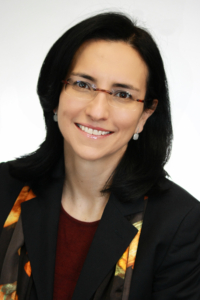 Nicki Gilmour, CEO of theglasshammer.com welcomed 250 women to theglasshammer.com ’s 5th Annual Women in Technology event last Thursday night at the auditorium at American Express. Guests enjoyed an amazing evening of shared experiences and good advice from the panelists who are all navigating their career paths as women in technology. The keynote, presented by Lucy Sanders, CEO of NCWIT addressed stereotyping in tech and how women can innovate which will be covered in full next week on theglasshammer.com.
Nicki Gilmour, CEO of theglasshammer.com welcomed 250 women to theglasshammer.com ’s 5th Annual Women in Technology event last Thursday night at the auditorium at American Express. Guests enjoyed an amazing evening of shared experiences and good advice from the panelists who are all navigating their career paths as women in technology. The keynote, presented by Lucy Sanders, CEO of NCWIT addressed stereotyping in tech and how women can innovate which will be covered in full next week on theglasshammer.com.
Avis Yates Rivers, CEO of Technology Concepts International Group and our moderator for the evening opened with a goal for the panel: to have a conversation with women who live the experience of being a woman in technology every day. These were exactly the type of women in attendance — technical women, engineers, coders, product and project managers and even a handful of CTOs.
The first question was posed around driving innovation from the seat that you are in.
Doris Daif, VP Digital Customer Experience, American Express by explaining what her team does and how she drives innovation on a personal and team level.
“We design digital products on behalf of the company, I drive innovation by leaving the office and talking to users and clients. I also give my team unstructured time to think about innovation and lastly we experiment by getting the product out the door in low fidelity ways to see what provides value for the customer. I deeply care about products that are meaningful to the end user.”
Doris explained her career path into technology from marketing at American Express into customer operations and then joining the technical side of the house.
“I had to learn the technical skill and I have had a lot of wonderful people who have taken bets on me and I have learned a lot, including from, the people who have worked for me.”
Justine Chen, who is a senior manager at SunGard, spoke passionately about how she innovates by looking at requirements and the problem, and then solving the problem by writing code.
Patricia Florissi began by explaining her job, which is CTO of Sales at EMC, a role she has had for 10 years.
“I am in that role to think more strategically in the sales organization and add deep expertise for customers to see where they want to go. I like to think that I use innovation when I am exposed to so many different meetings in so many cultures since we do business in over 100 countries. Everyday you try your best and bring that learning back to the institution to create more innovation in the design and delivery of products.”
Adda Birnir, CEO of Skillcrush, talked about how her customers are mostly women who are looking to develop their tech skills, sometimes to change careers, and how she drives innovation by being relentlessly focused on the end user.
Adda stated, “Every day I ask myself, are they (the user) having a good experience? Are we building a community that they need in order to succeed?” Adda went on to talk about how she has built up an ability to tolerate being wrong and not being ready to do things as a way of ensuring innovation in the field. She added, “If you get to the point where you can embrace that then that’s when you can really go out there and do great things.”
Adda also spoke about how she ended up in technology.
“I spent time with the production team at an online magazine where I worked and they were so overworked and they were happy to let me do tasks that they didn’t want to do. I was like ‘oh code, what is this? This is so interesting’ so they gave me forms to build and stuff that they didn’t want to do.”
Kimberly Bryant, Founder of Black Girls Code talked about her journey from electrical engineer to technology practitioner to founder of the only organization focusing on encouraging women and girls of color to get involved in technology.
“One of the things that I think my role allows me to do as an innovator is to be a disruptor in the field. We are always looking at ways to bring girls into robotics, into ‘hackathons’, and do things to change the stereotype and really challenge that every day in every way.”
Avis pointed out that after hearing our panelist’s stories there is no one path, and no traditional set way, to ascend in a technology career.
She commented how disappointing it is to see more than half of women leave in mid-career, especially considering how difficult it is to get women into the industry in the first place. Avis encouraged the audience to stay and see the bigger picture in their career trajectory.
“Often in Corporate America, we are placed in positions where we can’t see the value in at that point, but take advantage of those opportunities, take some learning from it and use it as a stepping stone to the next thing.”
Patricia offered some good advice from her personal journey, “Whatever you do, do it well and there is no other solution than hard work to get there. Also you have to be present, when you make the most out of everything, then you can really take advantage of the opportunities ahead of you. Don’t be afraid, take risks, what is the worst that can happen?”
Kimberly expressed her thoughts on the opportunities that are happening right now and agreed with Avis about staying in the game.
“I think there are so many opportunities for women and girls since so many industries are underutilizing technology, so just being open to where your career can lead is key.”
Mentors and Sponsors and Leaders
All of the panelists explained that they had mentors and also separate sponsors, with Kimberly providing clarification on the difference.
“It’s really important to know the role of the sponsor as opposed to the mentor. Sponsors advocate for you, and they are likely to be one of the most important people in your company or industry. Mentors can be someone above, below or a peer to give you advice. Really it is about building relationships all over your company, and it’s so key to building an organization inside or outside of a big corporation.”
Doris explained that the process of cultivating sponsors and mentors has to happen from a very genuine place, built over a long period of time, and keeping up those relationships as you move around the company. She commented, “It’s really important to think about ‘Who are my mentors and sponsors?’ Then nurture those relationships, even when you’re no longer working together.”
Patricia explained that sometimes you don’t know how to be a mentee or a mentor- and although it can feel good to talk, you need to have sponsors. She defined sponsors as, “Someone who cannot only guide you, but also stand up for you in a situation where you need help. If you think you are autonomous and can get what you want on your own, then wake up and smell the flowers.”
She explained that she typically cautions people to stay away from tunnel vision and instead to see what is happening around you.
“Sometimes the role you think you want in the future may no longer exist when you get there. You need to be open to the creation of new roles. If you make your own mountain then you can climb it; how could I have dreamed as a child that I wanted to want to be the CTO of sales since that role didn’t exist?” She added with her signature sense of humor.
Justine explained how she manages her mentor and sponsor relationships for maximum effectiveness. “I take an agenda with me every time I am going to meet with my mentor and my boss and both of them are here today” she added, “Each one of them is very different. To have a valuable relationship between two people, you got to have a plan!”
Feedback, Credibility and Confidence
When asked to talk about their learning so far, the panelists did agree that being credible is the number one thing that you have to be as a woman in technology.
Patricia, when asked what advice she had for the audience, stated her three prong approach.
“You own your own career, do not expect anyone to own it. You have to wake up every morning and ask yourself, ‘are you happy with what I am doing?’ Asking is free.” Secondly, she added that when people are passionate and authentic it comes through. And finally, “work hard is the third one, I don’t see it any other way, maybe there is another way but I haven’t seen it!”
Adda agreed that she believes that every day is a new day to do things better than you did it before. “The more that you can see feedback as your friend the more that can fuel your ability to be better – hearing feedback from the customer is one way I have done this.”
Kimberly also talked about teams and building organizations with the advice to hire the best people that you afford because you don’t want to be the smartest person in the room. Collectively you can then take the business to where you want to go. She added, “Learn to say no. I say yes to everything but burn out is real and that takes me away from my core objectives in my professional and even in my personal life.”
Doris disclosed that she wished she had more confidence and poise earlier in her career and has learned over time to be selective about whom you are getting that feedback from; not all advice is created equal.
“I have been the victim of too many points of view and I end up more confused than when I started. People who you have trust with, the advocates and the sponsors that are invested in you to succeed; those are the people you should listen to.”
Everyone agreed that internalizing every piece of feedback wasn’t very constructive and that especially in technology with code standards changing there is a lot of room to discuss your work and ensure that code is just code, regardless of who is creating it.
Thank you to our event sponsors this year: American Express, EMC, and SunGard for making this event possible. We look forward to 2015.
By CEO and Founder Nicki Gilmour







